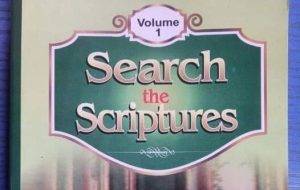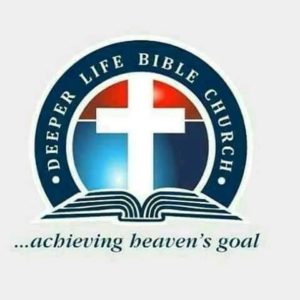 Deeper Life Search The Scripture July 2, 2023
Deeper Life Search The Scripture July 2, 2023
Read DCLM Search The Scripture July 2, 2023
ADULT STS LESSON 68
STRANGE FIRE IN THE TABERNACLE
MEMORY VERSE: “Then Moses said unto Aaron, This is it that the LORD spake, saying, I will be sanctified in
them that come nigh me, and before all the people I will be glorified. And Aaron held his peace” (Leviticus
10:3).
TEXT: Leviticus 10:1-20
DCLM Search The Scripture July 2, 2023 MESSAGE:
The speed and severity with God judged Nadab and Abihu in our text of study should kkindl reverence in all
that come nigh God as ministers. The incidence also exposed the weakness of the law in its inability to deal with
man’s sin. The imperfection of the Levitical order or priesthood is here underlined by the sin and punishment of
the newly ordained priests. No sooner was the priesthood inaugurated than it was violated. How unlike the
perfect and everlasting priesthood of our royal High Priest, Jesus Christ! Indeed, “the law made nothing perfect,
but the bringing in of a better hope did” (Hebrews 7:19).
Nadab and Abihu, on their own, and not by order, offered in the temple. It does not appear that they had any
command to offer incense at present, a role which belonged to Aaron, and not to them as yet; but without any
instruction and direction, they rushed into the holy place with their censers and offered incense, even both of
them when only one priest was to offer at a time, when it was to be offered, and this they also did with strange
fire. This may be an emblem of dissembled love, when a man performs religious duties without any cordial
affection to God, or obeys commands not from love, but selfish views. It may also amount to an ignorant, false
and misguided zeal not according to knowledge, but presumptuous and hypocritical. Or of false and strange
doctrines, such as are not of God, nor agree with the teachings of Christ, but foreign to the Scriptures. Finally, it
may pertain to human ordinances and inventions and everything that man brings on his own, in order to obtain
eternal life and salvation.
1. DIVINE JUDGMENT ON SIN
Leviticus 10:1-7; Exodus 30:9;Leviticus 4:2,3; Numbers 15:30
“And Nadab and Abihu, the sons of Aaron, took either of them his censer, and put fire therein, and put incense
thereon, and offered strange fire before the LORD, which he commanded them not” (Leviticus 10:1). We are
commanded that God must be worshipped on His own terms and according to His specifications. It is dangerous
to introduce human innovations into Christian worship or service or tamper with those ordinances in which we
have His commandments. In the Old Testament, the rites and ceremonies commanded by God prefigured
important and eternal truths which cannot be altered by any man without being guilty of stepping into His
exclusive prerogative. By examining the circumstances in which the sin of Nadab and Abihu occurred, we may
assume a number of infringements since “we are sure that the judgment of God is according to truth.” (Romans
2:2). One, it may be that they burned the incense at the wrong time in the course of the day’s service. Two, it
was not their duty to offer incense in that particular service.
Three, the sin could have been the result of self exaltation and pride rooted in the honor newly conferred on them. Four, they could have taken the fire for the incense from common fire as against the holy fire taken from off the altar. Five, they might have used in their censers a strange incense (also called fire) contrary to the express commandment that “ye shall offer no strange incense (fire] thereon [the altar of the sanctuary” (Exodus 30:9). Six, it could also be that they have burnt the incense, two of them at the same time, which was unusual. Seven, familiarity with holy things into which they were newly admitted could have bred lightness in attitude and loss of a sense of solemnity.
Eight, the suspicion of drunkenness and the resultant carelessness and misjudgment is strengthened by the proximity between this infraction and the introduction of the law addressed to Aaron and his remaining two sons: “Do not drink wine nor strong drink, thou, and thy sons with thee, when ye go into the tabernacle of the congregation, lest ye die…”( Leviticus 10:9). Nine, perhaps, the sin was committed presumptuously, that is, deliberately going beyond what they knew was right or appropriate. “But the soul that doeth ought presumptuously.. shall be cut off from among his people” (Numbers 15:30).
The above notwithstanding, if otherwise, Nadab and Abihu would likely
have benefitted from the then existing law that, “If a soul shall sin through ignorance against any of the
commandments of the LORD… then let him bring for his sin, which he hath sinned, a young bullock without
blemish unto the LORD for a sin offering” (Leviticus 4:2,3).
The sentence against the sin of Nadab and Abihu was speedily executed. Though God “is long suffering to us ward”, we must learn that He may choose to deal with the sinner with dispatch, particularly when, as is likely the case here, it is a willful sin. Anyone who willingly continues to sin has no divine guarantee of a continuing space for repentance. Many have been deceived into sin by the thought that their peculiar circumstances would make their sins to be ignored or taken less seriously in the court of heaven. The case of Nadab and Abihu is a clear warning that circumstances which we may consider as extenuating may not be so regarded by the Judge of all the earth.
Our safety is guaranteed only in doing what we know to be the will or commandment of God. The notion that God will understand and overlook a presumptuous sin is self-delusion. It is very instructive that the circumstances of Nadab and Abihu did not appear to have any mitigating effect on One, they were the sons of the high priest, Aaron; two, they were
recently anointed with the holy oil as men set aside for divine service; Three, their past records were
commendable. They had only seven days before diligently and successfully concluding the rites of consecration
to the priesthood; Four, they were young, inexperienced first offenders; Five, the infraction was committed in
the euphoria of their recent elevation; Six, the priesthood being restricted to the family of Aaron, had ‘only four
other members; seven, their death could so reduce the number of eligible persons for the priesthood because
they had no children and that the priesthood would be in danger of extinction or at best suffer a short supply
of personnel.
None of these supposed considerations could spare the offenders. Thus, we must pray for grace
and courage to do always that which we know to be the commandment of God even in difficult situations. “And
Moses said unto Aaron, and unto Eleazar and unto Ithamar, his sons, Uncover not your heads, neither rend your
clothes; lest ye die, and lest wrath come upon all the people: but let your brethren, the whole house of Israel,
bewail the burning which the LORD hath kindled (Leviticus 10:6). There can be no doubt that the death of Nadab
and Abihu caused great pain and sorrow in the heart of Moses. Nevertheless, he encouraged himself and
comforted Aaron by the word of God (Leviticus 10:3; Exodus 19:22).
Knowing the unfortunate incidence to be a
fulfilment of God’s word puts it beyond doubt as to its justice. In times of bereavement, affliction or adversity,
the best and most potent comforts are those we source from the word of God. The effect of the words spoken
by Moses to Aaron was very comforting and “Aaron held his peace”. In the midst of the ugly occurrence, we find
Moses showing greater concern to ensure that decorum and orderliness prevailed. He was more concerned to
ensure that Aaron and his two remaining sons were not, on account of what had happened, diverted or made
unfit for the work of the priesthood. He said “And ye shall not go out from the door of the tabernacle of the
congregation, lest ye die: for the anointing oil of the LORD is upon you” (Leviticus 10:7).
He insisted that
priesthood must, even in time of sorrow and misfortune, demonstrate that they value the honor and affection
for God and for His service than the dearest of their earthly relations. How unlike the common attitude among
some believers, whose service to God fluctuates according to their fortunes and misfortunes! Does such attitude
not amount to passing judgment on God’s Some would even entirely abandon the work or lower prerogative?
their commitment to Christ on account of offence by another believer. How unlike Job, when he suffered great
adversity, said, “Though he slay me, yet will I trust in him: but I will maintain mine own ways before him” (Job
13:15). The lesson here is that as true believers, pleasing God always and concern for His glory should always lie
closer to our hearts than our private fortunes.
Afflictions or temporary setbacks should, instead of taking us off
our duties, quicken us in them. Moses was also concerned about the effect any defect in the priesthood would
have on the congregation of Israel. “…And lest wrath come upon all the people” (Leviticus 10:6). Ministers and
leaders must always be conscious of the pervasive effect of any defect in their spiritual lives. The congregation
ought to count themselves highly favored by God when they have leaders who make the spiritual soundness of
their congregation their utmost concern; who labor to feed the flock with the knowledge of the word of God
and strive, their personal examples to demonstrate what the fear and reverence to God imply.
2. DIVINE CHARGE AFTER THE JUDGMENT
Leviticus 10:8-11; Numbers 6:3: Proverbs 31:4; 20:1; Jeremiah 35:6; Luke 1:15
“Do not drink wine or strong drink, thou, nor thy sons with thee, when ye go into the tabernacle of the
congregation, lest ye die: it shall be a statute for ever throughout your generations” (Leviticus 10:9). These
words from the Lord directly to Aaron after the incident of the strange fire suggest that the sin of drunkenness
may lie at the root of the infraction. Here, the word of the Lord shows how we may positively gain from God’s
judgment on others and even the consequent experience of other persons. As sure as God’s “goodness and
forbearance…leadeth {us} to repentance”, we must be equally affected by His judgment visited on others. With
a head and heart under control, a believer or servant of God will be able to discern between good and evil, holy
and unholy, and between clean and unclean (Leviticus 10:10).
An individual under the influence of alcohol or
any other intoxicating substance cannot remain within the boundaries of Scripture or be able to do according
to the will of God. “And that ye may teach the children of Israel all the statutes which the LORD hath spoken
unto them by the hand of Moses” (Leviticus 10:11). Teaching and instructing in the law and words of
righteousness are primary duties of God’s servants. They cannot be in bondage to other elements – internal or
external – and be able to discharge this responsibility faithfully, fully and fervently. Ministers of God cannot
afford to be slaves to sin, self, society or Satan. They must be men and women who have mastery (1 Corinthians
9:25) over themselves and are vessels of honor in the hands of the Lord.
As we behold around us the horrible
consequences of the neglect of God’s word, we should be cautious to separate ourselves from all sins. We must
double our guard knowing, as the Scripture warns us, to be separate from the world (2 Corinthians 6:14: James
4:4; 1 John 2:15-17). Drunkenness is a great sin before the Lord and is highly incongruent in the life of a believer.
It is condemned in many parts of the Bible (Proverbs 20:1: 1 Timothy 3:3; Titus 1:7). In the New Testament,
drunkenness is forbidden to both ministers and members. Christ singled out “eating and drinking with the
drunken” as one of the vices which may put the servant at risk of not being found ready for the return of the
Master (Ephesians 5:18; Luke 21:34). The reason for the prohibition of wine in the priesthood was the need for
sobriety and for the priest to be able to distinguish between what is sacred and what is common or vile. A
believer ought to have always the clearest head and sober heart, and not be caught up in the terrible mire of
drunkenness.
3. DIVINE COMMAND CONCERNING THE PRIESTS’ PORTION
Leviticus 10:12-19; 27:21; 24:9; Deuteronomy 12:27;2 Kings 23:9;1 Corinthians 10:18
Continuing in his efforts to restore order and reverence to the priesthood, Moses reminded Aaron and his
remaining sons of his earlier instruction from the Lord concerning eating of their (priestly) share of the sacrifices.
“And Moses spake unto Aaron, and unto Eleazar and unto Ithamar, his sons that were left, Take the meat
offering that remaineth of the offerings of the LORD made by fire, and eat it without leaven beside the altar:
for it is most holy” (Leviticus 10:12).
In the course of doing this, he observed that, contrary to the rule, the blood
of a goat for sin offering was not brought into the sanctuary (holy place) and yet the flesh of the goat was burnt
instead of being eaten beside the altar by the sons of Aaron. The rule was that if the blood of the sin offering
was brought into the holy place, then the flesh was burnt without the camp. If ,however, the blood was not
taken into the holy place, the flesh must be eaten by the priests. Moses gently (obviously considering the great
sorrow of heart Aaron was already enduring), rebuked him for this miscarriage. Aaron explained that he thought
the sorrowful state of their hearts consequent upon the death of Nadab and Abihu disqualified them in the sight
of God from feasting on the sacrifice as normal. In other words, it was the fear of displeasing God, not rebellion,
that informed their deliberate abstinence. Moses was satisfied with the explanation and apparently God also,
hence He took no notice of the irregularity.
The Old Testament altar besides which the priests ate the flesh of
the sin offering typified Christ, just as the sin offering also typified Him. Christ is therefore, both the sacrifice for
our sin and our Altar for our sacrificial love and service to God. He provides believers with an endless feast of
spiritual strength, renewal and the refreshing of spiritual pleasures. Those who continue in sin, or continue in
Mosaic rites and ceremonies, exclude themselves from the true altar and the true sacrifice (Hebrews 13:9-11).
However, any sinner who repents from sins before God becomes a welcome participant in the great spiritual
feasting around the true Altar – our Lord Jesus Christ.
DCLM Search The Scripture July 2, 2023, Sunday
Questions For Review:
1. What can we learn from the incidence of the strange fire?
2. How can we relate the problem of strange fire to the Christian service?
3. What is the danger in justifying sinful compromise and/or disobedience to God’s word on the excuse of the
peculiarity of our circumstances
4. Why was Aaron commanded not to mourn the deaths of his two sons?
5. What should be a believer’s attitude to his or her commitment to Christ in times of difficulty or sorrow?
6. Why should a believer totally abstain from alcohol and intoxicating beverages?
7. How can an individual partake of the altar of the Lord?
READ MORE TOPICS: OPEN HEAVENS, OUR DAILY BREAD, IN TOUCH, SEEDS OF DESTINY, STREAMS OF JOY, JOEL OSTEEN, MOUNTAIN TOP LIFE, DCLM DAILY MANNA, UCB WORD FOR TODAY




